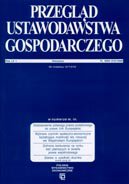Przegląd Ustawodawstwa Gospodarczego nr 11/2010
Miejsce wydania: 2010 Warszawa
Oprawa: miękka
Marcin Olszak, Uniwersytet Warszawski
Rekomendacje organu nadzoru bankowego-geneza, przedmiot regulacji, charakter prawny
Recommendations of the Polish banking supervisor – genesis, subject of regulation, legal character
According to the Article 137 point 5 of the Banking Act of 29 August 1997, the Polish banking supervisor may issue recommendations related to good practices of sound and prudent bank management. Recommendations have been published by Polish banking supervisory authorities since 1996. They are concerned with prudent and sound bank management in the areas of banking activity that have an impact on the safety of the funds held in bank accounts. The author concludes that recommendations, inter alia:
1. are a source of prudential regulations which are not legal norms;
2. consist of norms of conduct that are recommended by the supervisory authorities; those norms are not legally binding to banks; however, considering the fact that the supervisory authorities takes them into account while making an assessment of banks, they influence the bank’s behaviour.
Krystyna Nizioł, Uniwersytet Szczeciński
Podatek akcyzowy na paliwa silnikowe w Polsce – aspekty prawne i ekonomiczne
The Excise Tax on Motor Fuels in Poland – legal and economic aspects
The publication shows the Polish legal regulations concerning the excise tax on motor fuels such as leaded petrol, unleaded petrol and Liquid Petroleum Gas (LPG). In this paper also the European Union law regulations referring to the excise tax on motor fuels were presented. The Author had also made an attempt to characterize the factors which determine changes in the amount of this tax (such as the condition of the public finances, the national economy and the taxpayers). Moreover, the publication points the possible influence of these changes on the situation of transportation enterprises.
Anna Rogacka, Uniwersytet Śląski
Upadłość podmiotów uczestniczących w stosunku factoringu
Bankruptcy of the subjects participating in factoring relationships
The article was dedicated to discuss the issues of the bankruptcy of the subjects participating in factoring relationships. Factoring is said to be three –side legal relation as three subjects participate in it: seller, factor, debtor but the factoring agreement is two – side agreement as it is concluded between a seller and a factor. The article analyses four situations of bankruptcy in factoring such as each of the participants goes bankrupt, the position of the seller when the factor goes bankrupt, the position of the factor when the seller goes bankrupt and the position of the factor when the debtor goes bankrupt. The bankruptcy of the seller happens more often than the factor bankruptcy. Because of it there is a lot of attention paid to the problems that occur to the factor when the seller goes bankrupt it is pointed that the possibility to execute the liability from the seller is limited. The bankruptcy of the debtor is also mentioned in the article even though it is not the side of the factoring agreement but it causes implications that are important for the sides of factoring.
The source and the basis of the bankruptcy of the subjects participating in factoring relationships analysis was Bill – Bankruptcy and Repair Law, which is a set of the basic rules that are to reduce the negative results of entrepreneur insolvency.
Hubert Skwarczyński, Uniwersytet Łódzki
Przepadek korzyści majątkowej i instytucje z nim związane w prawie karnym skarbowym
Forfeiture of property benefit and other institutions connected with it in fiscal crime law.
The author analyses the penalty measures of property benefit forfeiture and he
elaborates in details the regulations regarding the forfeiture institution in
doctrine. There is also an analysis of possibility to execute the money
equivalent of property benefit on a ground of fiscal criminal code. Finally the
author analyses the possible resolutions regarding property benefit forfeiture.
KONSULTACJE
Michał Żurek, Uniwersytet Jagielloński
Modela prawne wspólnych przedsięwzięć poszukiwawczych oraz wydobywczych w sektorze naftowym i gazowym
Legal framework of prospecting and extracting joint ventures in oil and gas industry
The article analyses different models of agreements establishing the cooperation between investor and concession holder (operator) in oil and gas venture in Poland. These agreements include farm-in and farm-out agreements, joint-venture with farm-in and shareholders agreement as legal-transplants from common law jurisdictions are set against legal background of Polish laws regulating transfer of the concession (The act of 4 February 1994 Geological and Mining Law.)
The article introduces the concept of farm-in and farm-out arrangement in oil and gas mining industry. It is argued that legal position of an investor who performs mining operations (prospecting, exploration or extraction of deposits) may differ depending on whether he has been assigned mere royalty in the mining production from concession holder or also right of mining usufruct. Namely in the first scenario an investor shall secure the administrative authorisation for performance of mining operations know as concession, otherwise he may not enjoy possibility of legal performance of mining usufruct. Further the articles points out the divergence in Polish law between the assignability of shares in mining usufruct and concession which, as an administrative allowance, is not divisible. Thereby the applications of farm-in arrangement in Polish legal practice occurs to be significantly hindered. Similarly, the unincorporated joint ventures model may be jeopardised in the same way.
| Inpost Paczkomaty | 14 zł |
| Kurier Inpost | 14 zł |
| Kurier FedEX | 14 zł |
| Odbiór osobisty | 0 zł |
| Darmowa dostawa | od 250 zł |
| Darmowa dostawa w Klubie Książki | od 200 zł |

